And also let the golden and silver vessels of the house of God, which Nebuchadnezzar took forth out of the temple which is at Jerusalem, and brought unto Babylon, be restored, and brought again unto the temple which is at Jerusalem, every one to his place, and place them in the house of God. -- Ezra 6:5
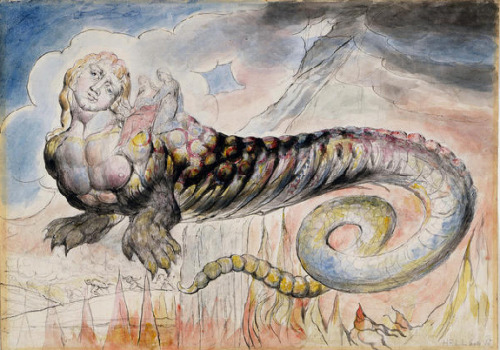
In their article "Manufacturing the Deadhead: A product of social engineering," Joe Atwill and Jan Irvin make the bold claim that the 1960s counterculture in the U.S. was largely the product of the efforts of two men:
Culture normally changes slowly and for many reasons, and the 60’s American drug counter culture was certainly a long time in the making. But, incredibly, most of the events that led to it can be traced back to two men: Gordon Wasson and his close friend Edward Bernays, the father of propaganda. Given Bernays’ background and political perspective, his role in bringing about the drug culture is highly suspicious.
It is interesting in the extreme to consider that the counterculture was manufactured by an elite conspiracy. Examining the lives of people like Wasson and Bernays we can definitely find suggestions of such a conspiracy. The conspiracy that Atwill and Irvin reveal, though, is not a small one.
Their claim, in full, is that just as Christianity was a conspiracy by the Roman Empire to entirely shackle the minds of the masses, so was the counterculture a conspiracy by top elites to break traditional conditioning, cause widespread confusion and dependency, dumb down the culture and ultimately pave the way for a neo-feudal Dark Age.
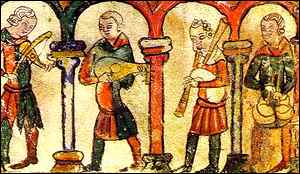
Atwill and Irvin identify six immense changes that they believe the agents of the elite, men like Bernays and Wasson, brought about by the 1960s in order to irrevocably transform traditional America.
If one compares the culture of Woodstock and the music drug scene of the 1960s with that of America at the beginning of the century, a number of distinct differences are visible:
1. Overt sexual images in the popular media (pornography)
2. Wildly uninhibited dancing
3. music idols
4. feminism
5. integration
6. psychedelic drug use

The present post will not look into the shady dealings of Bernays and Wasson. It will also not delve into the conspiracy of the Roman manufacture of Christianity. This article will, however, deeply examine the origins and scope of the counterculture and the idea that it emerged solely as the result of a vast conspiracy, as presented by Atwill and Irvin.
Germination
An excellent 2003 article by Gordon Kennedy and Kody Ryan entitled, "Hippie Roots & The Perennial Subculture," explores the possibility that much of the sixties counterculture in the U.S. can trace its roots directly back to much earlier alternative movements in Germany. Kennedy and Ryan discovered that these roots stretch far back into the past.
The authors explain that Roman historians, in observation of the "uncivilized" German tribes, noted their deep respect for both women and nature. In 98 A.D. Tacitus wrote:
According to German outlook, pronouncements of destiny seem to acquire a greater sacredness in the mouth of women. Prophecy and magic in a good as well as an evil sense is by choice the gift of women. If it is inherent in the nature of men to show the female sex a great consideration and respect, then this was particularly shaped on the German people from of old. Men earn deification through their deeds, women through their wisdom.
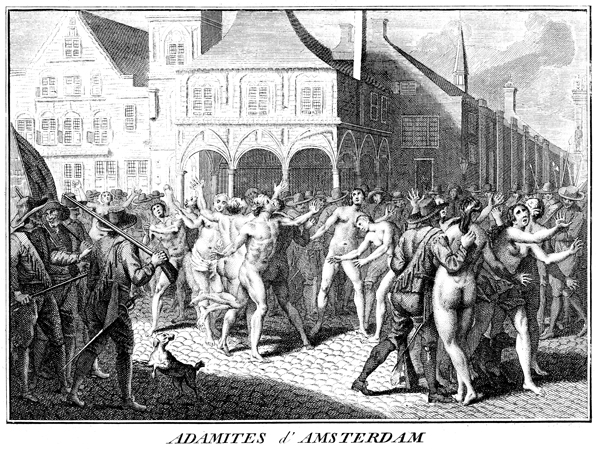
Feminism, it seems, long predated Edward Bernays. In the German Middle Ages we can also find abundant evidence of this "countercultural" spirit. Kennedy and Ryan discuss the heretical neo-Adamites and medieval mystics like Meister Eckhart. It is towards the end of the 19th century and start of the 20th, though, that we can begin to single out the direct ancestors of the hippies.
Kennedy and Ryan write about Eduard Baltzer, an ex-minister and author inspired by the works of Goethe and others, who in the 1860s set up vegetarian communities and considered himself the follower of Pythagoras. Baltzer inspired many others including a painter, Karl Wilhelm Diefenbach, who in turn set up "natural life style" alternative communities and gained his own inspired followers, including one of the first truly psychedelic artists known simply as Fidus.
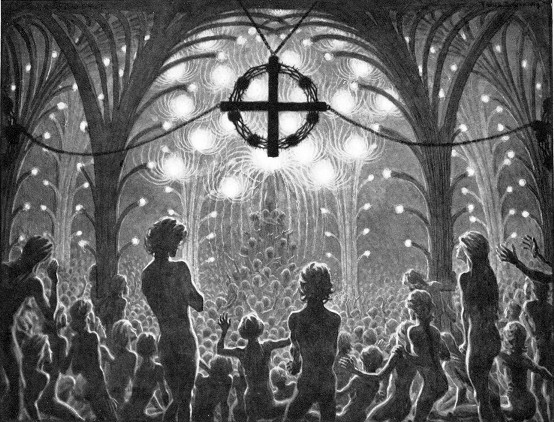
Another of Diefenbach's followers, the poet Gusto Graser, became the friend and teacher of writer Hermann Hesse. Hesse in 1908 wrote about how he and Graser lived and fasted in the caves of the Swiss Alps, and later used their relationship as a model for the guru-disciple relationship explored in his still very famous novel, Siddhartha.
Hesse and Graser were eventually to become members of perhaps the most known and influential of the "natural life style" communities of that era. This is Monte Verità (the "Mountain of Truth") in the Swiss fishing village of Ascona.
Further south in Switzerland, Ascona was a little fishing village on the shore of Lake Maggiore, on the Swiss side of the border with Italy. In the year 1900 a counter-culture renaissance began and lasted until about 1920. Ascona became the focal point for all of Europe’s spiritual rebels.
Life experiments were in vogue: surrealism, modern dance, dada, Paganism, feminism, pacifism, psychoanalysis and nature cure. A few of the participants were Hermann Hesse, Carl Jung, Isadora Duncan, D.H. Lawrence, Arnold Ehret and Franz Kafka.
The mythos of Ascona has grown to such stature that in 1986 an academic study by Martin Green was published, Mountain of Truth: The Counterculture Begins, Ascona, 1900-1920. Despite Green's title, though, Kennedy and Ryan make it clear that Ascona was only the most famous of several "life-reform" communities and movements that existed in Germany and elsewhere in the last decades of the 19th century. The counterculture did not even begin in Ascona.

One German alternative movement formed in 1896, the Wandervogel, had a lasting influence on the counterculture:
Wandervogel members, aged mainly between 14-18 years and spread to all parts of Germany eventually numbering 50,000. Part hobo and part medieval, they pooled their money, wore woolen capes, shorts and Tyrolean hats and took long hikes in the country where they sang their own versions of Goliardic songs and camped under primitive conditions. Both sexes swam nude together in the lakes and rivers and in their hometowns they established "nests" and "anti-homes", sometimes in ruined castles where they met to plan trips and play mandolins and guitars.
Aside from possessing obvious similarities to the much later hippies, the Wandervogel also had a complicated relation to the later Hitler Youth. Many of the Wandervogel directly opposed the Hitler Youth, which attempted to mimic the older movement's style and spirit, but a sizeable minority were also seduced into Nazi ranks. The Nazis went on to outlaw the Wandervogel and all other youth groups that contested their hegemony by 1933.
Before WW1, though, tens of thousands of Germans involved in "life-reform" movements like the Wandervogel and others involving nudism, vegetarianism, alternative medicine, yoga, feminism, modern dance, intentional communities, etc. -- AKA the counterculture -- emigrated to the U.S., particularly California, in order to escape the increasingly authoritarian turn of the German Empire under Kaiser Wilhelm.

Many of these German immigrants to California continued to promote "life-reform" in a land that was much more tolerant of new ways of being. One such couple was John and Vera Richter who established the "Eutropheon" -- the model for all subsequent health food stores -- in 1917. Eventually the Eutropheon attracted and hired as employees young American men who, inspired by the Germans, grew out their hair and beards, ate raw foods and lived in the mountains. They were called the "Nature Boys."
Kennedy and Ryan note:
This was decades before the Beats or Hippies and their influence was very substantial. In "On The Road" Kerouac noted that while passing through Los Angeles in the summer of 1947 he saw "an occasional Nature Boy saint in beard and sandals".
Where were Wasson and Bernays here? The Nature Boys gained international recognition when a song written by one of their own, eden abhez, became a hit. This was "Nature Boy" performed by Nat King Cole. Nature Boys like Gypsy Boots went on to have a huge influence on the early hippie scene, inspiring legendary bands like The Seeds and the earlier "Surf Bohemians" of the late fifties and early sixties.
Diabolic Forces
The method of guilt-by-association that Atwill and Irvin use to peg individuals like Terence McKenna as agents of the Conspiracy can, with some irony, be used against themselves. An easy starting point is Jan Irvin's relationship with the late and very controversial researcher, Eustace Mullins.
Irvin's website proudly boasts that he gave the "last interview" to Eustace Mullins (died 2/2 2010) on September of 2009. It is obvious that Mullins, "the greatest conspiracy theorist," has been a huge influence on Irvin's subsequent ideas, including his theories on the manufacture of the counterculture. But who is Eustace Mullins?
Mullins is now perhaps best known for his book, Secrets of the Federal Reserve (originally published under the title Mullins on the Federal Reserve in 1950). Mullins often visited the poet Ezra Pound while the latter was being held for treason at St. Elizabeths Hospital in Washington D.C. According to Mullins, it was Pound who inspired and encouraged Mullins to study and write about the U.S. Federal Reserve and the wider uber-conspiracy of international banking. Much of what is now written about by critics of the Fed can be traced back to Mullins' book.
Mullins, though, was not a passive researcher. He was a far right-wing activist who was openly associated with neo-fascist and white supremacist organizations. He was an avowed anti-Semite who wrote articles and books such as "Adolf Hitler: An Appreciation" and The Biological Jew, which leave little doubt about his most heartfelt beliefs. He writes about his background in "My Struggle Against The Jews:"
I became the object of the Jews hatred by events which moved in a straight line. Successively, I became the protégé of George Stimpson, the most respected journalist in Washington, who founded the National Press; and of Ezra Pound, the world-famous poet; and of H. L. Hunt, one of the world’s richest men.
Of the three, only Ezra Pound fought the Jews openly. And he suffered grievously as a consequence, spending thirteen years in a hideous, urine-soaked madhouse in Washington D.C.
Disturbingly, for a lot of conspiracy theorists today being an anti-Semite, which they prefer to spin as "anti-Zionist," is far less condemnable than having ties to the international Elite. At least one of Mullins' mentors, H.L. Hunt, did have extremely close connections to the very inner circles of the Conspiracy.

Researcher Josh Reeves, who like Jan Irvin came to discover that his own subculture -- the conspiracy/Truther movement itself -- was largely a product of conspiratorial manipulation, has much to say about Texas oil billionaire H.L. Hunt and sons in his documentary series, "The Secret Right."
Reeves explains that it was Hunt's son, Nelson Bunker Hunt, who was the primary financial backer for the foundation of the Council for National Policy in 1981. The CNP acts as a "conservative" counterpart to the "liberal" Council on Foreign Relations, although it is even more secretive and media-shy than the older CFR. In reality, however, both organizations attract highly elite and elitist individuals as members intent on furthering their own narrow class interests.

The CNP stems directly from the John Birch Society, co-founded by Robert Welch Jr. in 1958. Welch is actually a key figure in the present Spaghetti Theory of Conspiracy because it was Welch who first popularized the notion that behind even the Communists, behind all efforts to subvert and destabilize Western Civilization, lurked the sinister Illuminati:
But the Communist movement is only a tool of the total conspiracy. As secret as the Communist activities and organizations generally appear, they are part of an open book compared to the secrecy enveloping some higher degree of this diabolic force. The extrinsic evidence is strong and convincing that by the beginning of the Twentieth Century there had evolved an inner core of conspiratorial power, able to direct and control subversive activities which were worldwide in their reach, incredibly cunning and ruthless in their nature, and brilliantly farsighted and patient in their strategy. Whether or not this increasingly all-powerful hidden command was due to an unbroken continuation of Weishaupt's Illuminati, or was a distillation from the leadership of this and other groups, we do not know. Some of them may never have been Communists, while others were. To avoid as much dispute as possible, therefore, let's call this ruling clique simply the Insiders.
This is from Welch's 1966 essay "The Truth in Time," and it was largely Welch's Illuminati conspiracy theory that became the target of satire for groups and individuals like the Discordians and Robert Anton Wilson.

A surprising twist to all of this, however, is that Eustace Mullins was adamantly against the John Birch Society, which had expelled the racists and anti-Semites from its ranks in the 1960s. Mullins often claimed that the JBS was set up and funded by Nelson Rockefeller, and that Welch himself was a 32nd degree Freemason. Mullins also accused author G. Edward Griffin, a long term Bircher and a close friend of Welch, of plagiarizing his own work in Griffin's 1994 book, The Creature from Jekyll Island: A Second Look at the Federal Reserve.
It's quite obvious that Griffin's expose on the Fed was heavily influenced by Mullins' earlier work, but there are substantial differences between the two. Griffin and the Birchers advocate a full return to the gold standard as a foil against the abuse of fiat money by private bankers. Mullins, following Pound as we'll see, believed that gold was at the heart of the problem. The bankers have historically always hoarded gold. What was needed instead was a form of social credit -- money loaned by the State, not the banks, without charging interest, without usury.
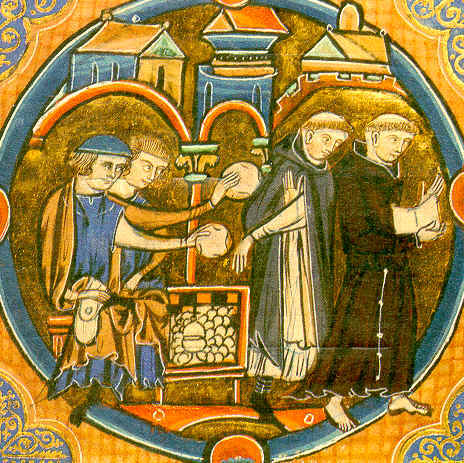
And unlike the Birchers, who argued that vague and shadowy groups like the Insiders or the Illuminati or later the New World Order were behind it all, Mullins was not at all shy in pointing fingers and naming names. At the crux of the whole conspiracy were the same Jewish banking families who have been ruling the West behind the scenes for centuries. And for Mullins at least, if not for Ezra Pound, Jews in general benefited from this conspiracy, which favoured the "parasitic" nature of all Jews.
It is alarming that Mullins gets a pass on this by "Truthers" and others in the "Patriot Movement." As noted above, though, discussions of the "Jew World Order"are now par for the course among "Patriots." The research of people of Josh Reeves, however, begins to pull the rug from under this whole milieu of hate. The entire "secret right" -- the Birchers, the Council for National Policy, Christian Identity, anti-communist militia groups, Mullins' own mentor H.L. Hunt -- is just the flipside of the same conspiracy.
In the last decade, for instance, it has come out that H.L. Hunt, through his involvement with the "Suite 8F Group," was potentially a major player behind the JFK assassination. Would this be a conspiracy that Mullins backed? Would his followers? Or was Mullins wrong about Hunt? Was Mullins inadvertently working for the same Agenda that he thought he was against? Can the same be said for Irvin and Atwill?

In any case, though, the influence of Eustace Mullins is enormous. Through Griffin, in modified form, Mullins' critique of the Fed became a banner cry for the Ron Paul movement and the Tea Party. But the origins of Mullins' ideas, by his own proud and repeated admission, was from the only of his mentors who had openly "fought the Jews," Ezra Pound. Pound, in a sense, began this entire movement. But can the great poet Ezra Pound by reduced to just this?
A Lead Role In A Cage
Pound was arrested on the May 2nd, 1945 at his house in Rapallo, Italy. By May 24th he was brought to the United States Army Disciplinary Training Center to the north of Pisa. For three weeks Pound was confined to a six by six and a half foot steel cage with a concrete floor and very open to the elements. He was denied exercise and conversation and at night his cage alone was floodlit to disturb his sleep. At the end of the three weeks Pound suffered a near complete physical and mental collapse.

He was then moved to a tent in the Medical Compound where he stayed for the next six months. It was here that Pound wrote much of his most celebrated work, The Pisan Cantos, which was controversially awarded the Bollingen Prize in 1948. In November of 1945, Pound was transferred to the U.S. to stand trial for treason, largely because of a series of radio broadcasts he made on Rome Radio for income during the war. He was deemed mentally unfit and was incarcerated at the St. Elizabeths psychiatric hospital in D.C. for almost 13 years.
Pound had many guests at St. Elizabeths including some, like the young Eustace Mullins, who were attracted to Pound because of his exposure of what they thought was an immense Jewish conspiracy. Whatever Pound really thought of these cranks (and at this time Pound was almost universally reviled as a fascist crackpot himself) they did come to his aid. Mullins assisted Pound with his research and eventually wrote the poet's only authorized biography.
Pound's own anti-Semitism cannot be easily overlooked and brushed away, although there have been many attempts to do so since the poet's death in 1972. Sympathetic critics have pointed to the fact that Pound dedicated one of his later books to his old friend the Jewish poet and communist, Louis Zukofsky.

These critics claim that while Pound was a supporter of Mussolini and sympathetic to Hitler, that this support was almost entirely on economic grounds. Pound sincerely believed, as did many others, that these leaders were opposed to the same usurious international banking system that he wanted to abolish. This, however, was not so.
Pound, like nearly everyone in Italy and the vast majority of people in Germany, had no idea what was really going on in the German concentration camps. That horror did not become public until after the war. And Pound thought that the "small Jews" were being used as scapegoats for the crimes of the handful of "big Jews" -- the international banksters. In an article from November 1935, Pound wrote:
USURERS have no race. How long the whole Jewish people is to be the sacrificial goat for the usurer, I know not.

Towards the end of his life Pound denied to several people, including to Allen Ginsberg as I'll get to, that he was an anti-Semite. He seemed to regret the whole thing. Just a couple of weeks before his 87th birthday, Pound read some verses to friends at a cafe which appear to challenge even his conviction that usury was at the heart of the world's problems:
re USURY / I was out of focus, taking a symptom for a cause. / The cause is AVARICE.
Nonetheless, Pound cannot be given a clean slate on the matter of anti-Semitism. Reading the transcripts of his Rome Radio broadcasts bring much of the poet's inner ugliness to light. Here he is in a 1942 broadcast to the people of Great Brittain:
You let in the Jew and the Jew rotted your empire, and you yourselves out-jewed the Jew. Your allies in your victimized holdings are the bunyah, you stand for NOTHING but usury.
And above metal usury; you have built up bank usury, 60% against 30 and 40%, and by that you WILL NOT be saved. Corrupting the whole earth, you have lost yourselves to yourselves.
And the big Jew has rotted EVERY nation he has wormed into.
This is a classic Jew-hating diatribe, euphemisms about the "big Jew" aside, and the fact that Pound's ideas are still being used to educate and inspire avowedly anti-Semitic and racist groups to this day demonstrates that these notions were not at all peripheral to the poet's philosophy. Instead, they remain a fundamental part of his understanding of economics.
Dionysus Stalks The Suburbs
Ezra Pound was struck by two things as he advanced in his career as a writer. The first was how impoverished he and his fellow writer, artist and musician friends and acquaintances were despite of their obvious talent and occasional genius. Unlike artists during the Renaissance who, because of very generous grants provided by rich and ruling class patrons, were able to flourish creatively Pound and his friends, like almost all artists of today, were just barely scraping by. They were forced to produce art-objects to sell and/or take on secondary jobs just to feed and shelter themselves.

Creativity is obviously stifled under these conditions. Pound began to see this as being very intricately related to the other, even bigger, tragedy of his time -- the First World War. The war left his entire generation either dead, wounded, traumatized or bereaved. An analysis by Pound on what caused this senseless war, as well as the economic collapse that occurred shortly after it, led him to conclude that the main beneficiaries were the big banks. War is a racket and the money-men, through loans and debt, profit at the expense of both sides.
These two, war and the impoverishment of the arts, are related. Pound began to become attracted to the Social Credit movement of C.H. Douglas. Hugh Kenner in The Pound Era neatly summarizes Douglas' teaching which grew to have such an immense impact on Pound:
To recapitulate: the Douglas hypothesis, that the money distributed by production will not buy the product, means that there is a perpetual shortage of money. The money is created as interest-bearing debt: this, and not any quibble over interest rates, is what Pound means by usura.
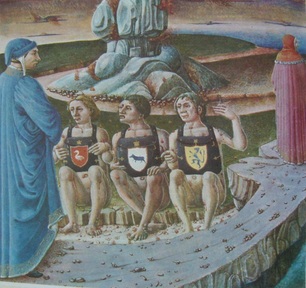
As more and more money is required to pay off existing debts, and the interest payments to these debts, investment in general becomes more conservative. Loans, issued by banks that create them out of nothing at high rates of interest, are only provided to projects and products that can be easily sold and resold.
Products, and culture in general, become increasingly standardized. Quality takes a back seat to quantity and ease of distribution. Planned obsolescence becomes essential. Usefulness becomes equated with salability. Things are manufactured to be quickly disposed of, and individuals as "consumers" become likewise interchangeable, disposable. And when the economy becomes entirely saturated in debt, to the point where the system begins to crack, wars are also manufactured -- projects of creative destruction to sell munitions to both sides and build anew.

This is the system that Ezra Pound rightly railed against. It is a system of waste and strife that everyone should recognize still very much encages us today.
Douglas, and later Pound, realized that Karl Marx had overlooked the crucial importance of usury. The basic contradiction in the economy is not the profit gained by production -- the so-called "surplus value." Workers generally concede that their employers should deserve a higher return for risk and initiative. What causes the real imbalance in the system, however, is the existence of finance capital that greatly profits, at higher and higher amounts, and yet produces nothing.

The solution to all of this, for Douglas, was obvious -- the government issue of abundant non-interest-bearing loans. Pound certainly agreed, but as his studies progressed and the international situation deteriorated he began to look beyond the ostensibly flawed system to the class of individuals who solely profited from it. Hugh Kenner explains Pound's divergence from Douglas:
And where Douglas in 1919 had argued that humanity was being impoverished by a mistaken accounting system that inflated prices by including false costs in them, Pound in 1938 was convinced that the mistaken economic system masked conscious evil, willed by elusive men who had gathered into their hands the power to issue what everyone else went into debt to borrow, and into still deeper debt to repay.
We know from Pound's later Rome Radio broadcasts that the "conscious evil" that he had unmasked became increasingly identified by him, as by many others in his day and unfortunately far too many even now, as the Jews. The Jews, in his mind, became synonymous with usura. He began to speak of "jewsury."
If it is possible, though, to re-separate these two I think much progress can be made. And in opposition to present-day advocates of the absolutist Zionist/Illuminati conspiracy theory, the anti-Semite brain tumour should be sliced off as a gross category error in logic -- something Irvin and the Trivium junkies should be very interested in. Simply put; not all bankers are Jews and not all Jews are bankers.

If, for historical reasons, there are proportionally more Jews involved in international finance than are other ethnic groups (most likely excluding WASPs) then this constitutes a mafia, a mob, not a group that represents all Jews.
Exactly like all other mafia organizations -- the Italians, the Russians, the Japanese, the Chinese, the Anglo-Saxons, etc. -- members of the Jewish mafia (Pound's "big Jews" if we want to be generous to him) have absolutely no loyalty to their poorer cousins. Their narrow class interests, in contrast, ally them naturally with their elite counterparts of every other ethnic background.
The 0.01% have no creed, colour or religion and we are divided and conquered by them when these things start to obsess us. Almost nobody is anti-Japanese because of the Yakuza or anti-Italian because of the Mafia. We would call a person a fool if they were. So should it be in every case.

In a letter Friedrich Nietzsche, another great thinker whose words were later twisted to justify generalized hatred, wrote to a friend in 1889 he exclaimed:
I am just having all anti-Semites shot.
-- Dionysus
Pound, who in spending almost thirteen years in "a hideous, urine-soaked madhouse" arguably suffered a worse fate than being shot, appeared to experience remorse towards the end of his life. Allen Ginsberg finally met the legendary poet in Venice in 1967. Pound was having his eighty-second birthday party. Ginsberg remembered their conversation:
Ginsberg: "The more I read your poetry, the more I am convinced that it is the best of its time. And your economics are right."
Pound: "Any good that I've done has been spoiled by bad intentions -- the preoccupation with irrelevant and stupid things... The worst mistake I made was that stupid, suburban prejudice of anti-Semitism. All along that spoiled everything."
Ginsberg: "Ah, it's lovely to hear you say that."

Ginsberg later played the Beatles and Bob Dylan for the old poet, chanted Hare Krishna, and smoked a joint. The two poets enjoyed each other's company.
Towards Amor
This meeting is remarkable in many ways. Ginsberg, a Jew and a longtime Marxist, both forgives Pound and admits that his critique of finance capital and usury is correct. Pound, in his turn, confesses that his anti-Semitism is where he went wrong.
Beyond this, though, is the fact that for people like Mullins, and perhaps even Irvin, such a meeting should never have taken place. Here we have, according to Irvin, the arch-conspirator Ginsberg embracing and being embraced by a man who was one of the first to expose the conspiracy. What's going on?
If we look into this, though, it's really not that surprising. Ginsberg's own mentor was William Carlos Williams, an old and close friend of Pound's and a great Modernist poet in his right. The whole Modernist movement practically owes its existence to Ezra Pound.
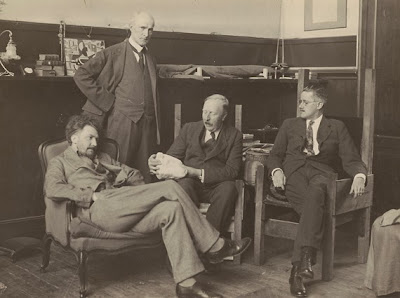
Pound was the editor of T.S. Eliot, James Joyce and Ernest Hemingway. Eliot and Hemingway were later awarded a Nobel Prize for Literature, and Ulysses is still widely acclaimed as being the best novel of its century. All three authors very openly acknowledged that their success was in large part due to Pound's excellent editing skills. Pound was also the secretary of Yeats, an editor of several literary magazines, and an invaluable aid to numerous writers and artists.
If, as the article by Kennedy and Ryan outlines, the multifaceted German "life-reform" movement of the late 19th/early 20th centuries was a source for the sixties counterculture then another, related, source was Modernism. And Ezra Pound was at the heart of it. The Modernists directly inspired the Beats and the Beats were the major inspiration for the Hippies.

Ezra Pound, then, really spawned two movements which revisionists like Jan Irvin would have us conclude are entirely at odds with each other. Pound, through Mullins and later monetary reformers like Griffin and Ron Paul, is the major source behind the End the Fed movement. Pound, through Williams, through the other Modernists, and through Ginsberg, is also a major source for the sixties counterculture.
When we read deeply into Pound's writings in The Cantos and in other works, ignoring, forgiving and husking away the "stupid, suburban prejudice" that occasionally bears its ugly head, we can begin to see how the psychedelic/alternative spirituality counterculture structurally and energetically syncs with the movement against debt-based finance. Pound realized long before most that cultural and economic transformation and liberation must occur together. The two movements should exist as one.


















![[Maccari-Cicero.jpg]](https://blogger.googleusercontent.com/img/b/R29vZ2xl/AVvXsEg8ZPXxnzn-ALxlWszNapVngcCzVFlRYGgPaFJRXk1u0jz9Bf7OlJSRVrf1udaFQpuXVKX6oFdWjpWFIa9H9JHVknrS203EM__J-vNyAlSpr-wnnk5_TKrOTrk56sYm9SAw3s1pq4-Zf-YF/s640/Maccari-Cicero.jpg)
.jpg)





![[waltwhitman-camden1891.jpg]](https://blogger.googleusercontent.com/img/b/R29vZ2xl/AVvXsEjXNyE9kHlLERkc16KOKmVfIm8laJeBW6BIAxJGg0dP5FIycIoOdh1285n08xw189gHkVIYyFDwvRlgwqIB9Gs1CdYKtQT8DTzOrRpXp9zVg9-5sTHcesdSGyd-mMA0OGw3mkdq8M5_p_T9/s1600/waltwhitman-camden1891.jpg)